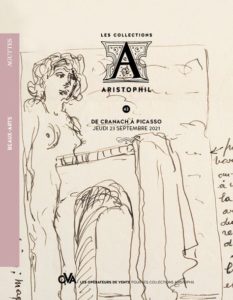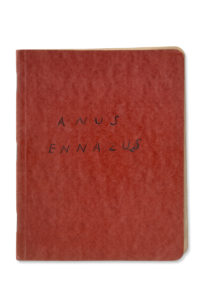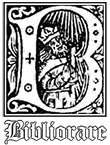PICABIA FRANCIS (1879-1953). — MANUSCRIT autographe signé, Anus Ennazus, 7 août 1946 ; cahier petit in-4 (22 x 17,5 cm) de 25 feuillets, sous couverture cartonnée rouge avec titre autographe. — Première version du poème Ennazus.
Description
Picabia a composé ce recueil de poèmes, longtemps resté inédit, pendant des vacances en Suisse, à Rubingen, dans la famille de sa femme Olga ; ces textes sont le reflet des relations amoureuses tumultueuses de Picabia avec sa maîtresse Suzanne Romain (Ennazus est le renversement de Suzanne) [sur cette liaison, voir Carole Boulbès, Picabia avec Nietzsche. Lettres d'amour à Suzanne Romain (1944-1948), Les Presses du réel, 2010]. Picabia en a établi un dactylogramme fautif, intitulé Ennazus, adressé en novembre 1946 à Christine Boumeester, et qui fut publié en annexe des Lettres à Christine (Gérard Lebovici, 1988, p. 201- 246), avant d'être recueilli dans les Écrits critiques (Mémoire du Livre, 2005, p. 625-671).
Ce manuscrit en donne une version antérieure, avec d'importantes variantes.
[1] Titre : «FRANCIS PICABIA/- / ANUS/ ÉNNAZUS / - / PRÉFACE/ DU/ POÈTE IGNORÉ/ = / poèmes».
[2-3] Préface, signée en fin : «Le poëte ignoré», dans une version différente du texte publié : «Francis Picabia est toujours resté lui-même au milieu des écrivains et des peintres - Tout ce qui touche à son coeur, à son indépendance se heurte, depuis son enfance avec les hommes, il est en conflit en lutte avec le monde - Ses adversaires ne désarment pas ; chacun d'eux épiant ses faiblesses. Et pourtant c'est son chemin depuis des années qui nous conduit à l'affranchissement»... Citons encore la conclusion : «Le problème qui se pose maintenant est celui-ci : à supposer que Francis Picabia ne causât pas le moindre préjudice à personne, je devrais néanmoins déployer tout mon zèle à le combattre. / Pourquoi ? / Parce que je suis plein d'absurde moralité, et que je dois m'opposer à tout ce qui peut la blesser».
[4-24] Prose poétique, sans titre, que vient interrompre à sept reprises un refrain de cinq vers :
«Au fond du jardin
une grille ouverte
des traces de papillons
sans laisser de traces
montent vers le ciel».
Cette prose correspond, avec d'importantes variantes, au poème Derniers jours et à la première moitié d'Adieu (Écrits critiques, p. 629-662) ; le texte sera alors découpé et présenté en vers libres. Citons le début (avec quelques fautes d'orthographe) : «Toi, qui a plongée tes yeux jusqu'au fond de mon coeur, tu pourras dire comment ton si grand amour, qui était, notre vérité, t'est devenu inutil. Ce sacrifice de l'amante lorsqu'elle abandonne père et mère, brave tout et supporte tout, les privations les plus dures pour atteindre son but, te sont devenues étrangères, et cela parce que tous tes efforts ont été uniquement pour toi. Égoïsme épanoui, borné, tes passions jusqu'au jour où tu m'as rencontré ont été mesquines, misérables, unilatéral. / Celle qui vit pour un grand amour, pour une mission sublime, ne doit se laisser effleurer par aucune médiocrité, elle doit se dépouiller de tout intérêt matériel»...
Le texte s'achève ainsi : «À moins qu'on ne puisse se figurer que le sujet de son amour ne soit qu'un rêve, une illusion. Il nous est permis de juger, mais il faut juger avec amour, car il fait le fond de nos pensées et de notre idéal. / [Refrain, avec le vers final modifié:] descendent vers le ciel : / pour voir le cercle magique de celui et de celle qui ont compris qu'il n'y a jamais ni commencement ni fin». Suivent la signature et la date. [25] Deux aphorismes terminent le cahier. «Je suis un mauvais garnement comme la règle et la loi de toute doctrine chrétienne, dans l'histoire du monde. C'est moi qui incarne maintenant la divinité de l'homme sans salu. / -/ Le meilleur chanteur du monde n'a pas de bouche : c'est ce que j'ai de plus moderne à vous présenter». —
PROVENANCE Francis Picabia. Une collection (Ader, 13 décembre 2012, n° 65).
MANUSCRIT autograph, Anus Ennazus, August 7, 1946 ; small notebook in-4 (22 x 17.5 cm) of 25 leaves, in red hardcover with autograph title. — First version of the poem Ennazus. — Written in black ink on the front pages of a small-square notebook, this manuscript is signed and dated at the end : "Francis Picabia / Rubingen 7 August 1946". — Picabia composed this long-unpublished collection of poems during a holiday in Rubingen, Switzerland, with his wife Olga's family ; these texts reflect Picabia's tumultuous love affair with his mistress Suzanne Romain (Ennazus is the reversal of Suzanne) [on this affair, see Carole Boulbès, Picabia with Nietzsche. Lettres d'amour à Suzanne Romain (1944-1948), Les Presses du réel, 2010]. Picabia drew up an incorrect typed version, entitled Ennazus, addressed in November 1946 to Christine Boumeester, which was published as an appendix to Lettres à Christine (Gérard Lebovici, 1988, pp. 201-246), before being collected in Écrits critiques (Mémoire du Livre, 2005, pp. 625-671). This manuscript gives an earlier version, with important variants. [1] Title : "francispicabia/- / anus/ ennazus/ - / preface/ of the/ poetignore/ = / poems". [2-3] Preface, signed at the end : "Le poëte ignoré", in a different version from the published text : "Francis Picabia has always remained himself in the midst of writers and painters - Everything that touches his heart, his independence clashes, since his childhood with men, he is in conflict in struggle with the world - His adversaries do not disarm ; each of them spying on his weaknesses. And yet it is his path for years that leads us to emancipation"... Let us quote again the conclusion : "The problem that arises now is this : supposing that Francis Picabia did not cause the slightest harm to anyone, I should nevertheless deploy all my zeal to fight him / Because I am full of absurd morality, and I must oppose everything that can hurt it". [4-24] Untitled poetic prose, interrupted seven times by a refrain of five lines : "At the bottom of the garden, an open gate, traces of butterflies without leaving any trace rise towards the sky". — This prose corresponds, with important variants, to the poem Derniers jours and to the first half of Adieu (Écrits critiques, p. 629-662) ; the text will then be cut up and presented in free verse. Let us quote the beginning (with some spelling mistakes) : "You, who have plunged your eyes to the bottom of my heart, will be able to say how your so great love, which was, our truth, became useless to you. That sacrifice of the lover when she abandons father and mother, braves all and endures all, the hardest privations to reach her goal, have become foreign to you, and that because all your efforts were only for you. Your passions, until the day you met me, were petty, miserable, one-sided / She who lives for a great love, for a sublime mission, must not allow herself to be touched by any mediocrity, she must divest herself of all material interests"... The text ends with the following : "Unless one can imagine that the subject of one's love is only a dream, an illusion. We are allowed to judge, but we must judge with love, because it is the basis of our thoughts and our ideal. / [Refrain, with the final verse modified:] descend towards the sky : / to see the magic circle of the one who has understood that there is never beginning nor end. The signature and date follow. [25] Two aphorisms end the notebook. "I am a bad boy as is the rule and law of all Christian doctrine in the history of the world. It is I who now embody the divinity of the unsalted man / -/ The best singer in the world has no mouth : this is the most modern thing I have to present to you." — PROVENANCE Francis Picabia. A collection (Ader, 13 December 2012, No. 65).




